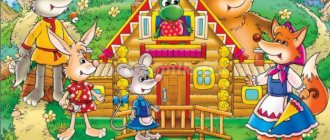Three to five
At this age, the child continues to appreciate other children for their “interestingness.” Children need friends who love the same games, who wear beautiful things, who have interesting toys. A comfortable child can become a friend: for example, a bright girl-leader and a quiet, thoughtful boy who is ready to listen to his friend and participate with interest in her ventures will make great friends. Children's friendships are not yet strong, friends can change every day: today the one who lets them ride a bike is appointed as a friend, tomorrow there is already a quarrel with him because he fights or lets another child ride a bike. There is no need to be strict about these changes; let the child choose with whom to play and be friends.
In addition, at this age, the baby should already be able to consciously establish contact and stand up for himself. Therefore, you need to teach him the right words: how to get acquainted (“Hello, my name is Sasha, what’s your name? Let’s play train!”), how and what to thank, apologize, ask, refuse... The baby learns to play by the rules, to give his own toys to others and take them back, observe the “queue” principle, participate in role-playing games such as car racing or “mother-daughter”. Situations for training these skills will arise every day, and you need to teach your child to act correctly, to achieve his own goals, to stand up for himself, but also not to interfere with other people’s boundaries. If an upset child, whose toy was taken away or who is not wanted to play with, comes to you for help, first help him resolve the conflict himself, suggest words and behavior. And only if the conflict drags on, intervene correctly and give the child an example of polite and confident interaction with the offender. After the conflict, you can discuss the events with the child, help him understand who was right and who was wrong, and how he should have behaved.
Five to seven
The older children get, the longer they can play together. Moreover, their communication is not limited to playing or playing roles; they already talk about abstract topics, discuss cartoons, books, events, and even gossip. At this age, a good reputation with friends becomes important, so on the playground or in kindergarten our children may behave completely differently than at home. This is normal, because adults at work or in a friendly company often behave differently.
In order not to harm the child’s reputation and not to injure him, do not scold him in front of everyone, do not kiss him, stay close to him with respect, the child will appreciate this and be grateful. If a conflict occurs, watch until the situation gets out of control. And only in the event of a fight or protracted conflict can you approach the children and find out the details, help them understand the quarrel from the position of an independent judge, without taking anyone’s side. Unite children by interests: hang out with the children with whom your child goes dancing or drawing, together they learn to discuss what they see and hear. At this age, children are already beginning to appreciate the personal qualities of friends (and not just a nice cap, dress or bicycle); they can become attached to friends and suffer if they treat them unfairly. Discuss difficult situations with your child, explain the motives for your friends’ behavior, and talk through the motives for your child’s behavior. This will help him understand people better, be observant and less hurt in relationships, and not take other people’s awkward actions to heart.
Friendship is life
Friendship is of great importance for human development and well-being. Friends support each other, broaden their horizons and take them to new milestones. They give us the joy of unselfish, sincere communication, sympathy, unity, and play. For more than 75 years, Harvard has been researching how people develop in adulthood, and now scientists can say with confidence: the quality of life, its duration, and health are most influenced by the good relationships that a person maintains throughout life. If you know how to care and accept care, communicate joyfully, and make friends, then you will live happily ever after. In general, we already knew this, but now we are receiving scientific confirmation. So, helping your child learn to make friends, build good connections, and establish beneficial exchanges with people is very important.
However, it is worth keeping one thing in mind regarding children and friendship. A small child is a deserved egoist, and that’s normal! He looks at the world as a playground, and feels himself to be the shining navel of the earth. Gradually he grows, develops, discovers the strange circumstance that other people love and protect themselves first of all, and not him (and this is not always a pleasant discovery). He becomes imbued with the magical possibility of sympathizing with and appreciating another. This is how a person gradually develops and matures. Unfortunately, overcoming a child’s egocentric position does not happen to everyone and not always; some people remain stuck in infantile egoism for years and decades. This is sad and terribly inconvenient, especially for loved ones; it hinders the development of the person himself and is difficult to overcome. So it is better to help the child gradually come out of his egoistic shells even before growing up, and friendship will be very useful here.
Teenagers
From the age of 11-12, a child has a need to empathize and share intimate things - at least he begins to learn this. And someone becomes a friend to whom you can tell about painful things, who will understand and listen. Now the attitude towards a friend becomes special; it is teenagers who are often very jealous of their friends. Close friends sometimes become more important authorities than mom and dad, and parents can be offended by this behavior. But we must remember that a child gets a very important life experience with friends. It is in more “adult”, and not early childhood friendships, that a child learns to be aware of himself, his needs, including the need for a loved one. Through these relationships, he will learn to relate his own and other people’s experiences, interests, goals and values.
Teenage friendship is necessary for a child to exchange emotions, a sense of belonging to a gender, a social environment, for the sake of a sense of spiritual kinship. Now friends and the “party” become important for communication, and the game remains only an addition to friendship, and not its basis. And if you ask a child why he is friends with this person, he will name his friend’s attractive qualities: kind, cheerful, always helpful, honest, smart. Although earlier you would have heard that a friend simply knows how to quickly disassemble cars or come up with games. Although quarrels do arise between older friends, children do not stop being friends because of this, while younger ones would simply stop communicating the next day. This speaks to the meaningfulness and importance of friendship for school-age children; they begin to value friendship and understand that without friends, life is not so full and interesting. Moreover, the older a child gets, the fewer real friends he has left. If previously at least the entire kindergarten group could be considered friends, then at school there are up to 5 people whom the child can call his friends.
At the same time, parents should keep an eye on who their child is friends with and what kind of company they keep. And if a child hangs out with frankly dangerous teenagers, measures are needed: take him to different sections and clubs, and in serious cases, change school or even place of residence.
Imaginary friends
Some children “make” imaginary friends, and their mothers immediately begin to worry: the baby lacks communication, he grows up withdrawn, no one understands him. But psychologists say that most often an imaginary friend is a sign of good fantasy. This is how the baby intuitively finds a way to deal with fear (it’s not so scary in the dark with a “friend”) and other experiences, and demonstrate his new interests and abilities. Therefore, do not laugh at the baby’s imaginary friend and do not criticize their communication, because the child will most likely be offended by you and express all his experiences to an invisible friend.
Of course, if you are worried about a child’s behavior, then you should consult a psychologist, but the situation becomes dangerous when an imaginary friend takes over the child’s consciousness and life, and he can no longer distinguish the game from reality. It is also worth paying attention to whether the child’s stories and games with his “friend” are cruel. Another reason to contact a specialist is a child’s refusal to play with real children and the appearance of imaginary friends in adolescence.








